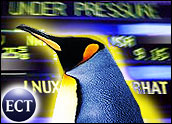Waiting for a PC to boot up can be quite boring. Who wants to sit there and watch the Microsoft Windows hourglass graphic for a seemingly interminable amount of time?
This problem has plagued the PC industry for years. But a solution could be at hand, at least for entertainment PCs — those PCs built around Microsoft’s new Windows XP Media Center Edition operating system.
InverVideo, a Fremont, California-based company that traditionally has focused on middleware applications, is now marketing a Linux-based technology designed to boot entertainment PCs much more quickly than a pure Windows PC. The software, called InstantON, provides Windows CE-like access to several applications, including e-mail client, Internet chat and TV functions such as viewing shows or recording programs to DVD.
Boosting Boot Times
Before now, the only real solution for slow boot times for many users was defragging their hard drives, Bob Nolan, CEO of Raxco Software, said. Industrial-strength defraggers can reduce “boot times by 10 to 20 percent,” Nolan told LinuxInsider in an interview.
But the new Linux-based InstantOn software — and similar software being developed by others — is aimed at taking advantage of the power of Intel’s Pentium processors, not at fixing fragmented hard drives. The software integrates into the Basic Input Output System (BIOS), the operating system, the computer’s power management system and even its noise-control system.
A partition on the hard disk houses the Linux software in an area separate from the Windows operating system. The developer claims that with the new software, the boot time is brief — a mere 10 seconds. When a user turns on the PC, the InstantON software preempts the Windows boot sequence and takes over, quickly loading basic entertainment functions.
Business Applications
Moving from the quick-boot entertainment functions into Windows, however, will take users more time than the initial 10-second boot because the InstantON software must hand off the user to the Windows operating system at that point.
Still, the company believes that most users inclined to use PCs as entertainment machines in their living rooms are accessing those machines mainly for entertainment-related functions, rather than to run business applications like Microsoft Word or Excel.
The product is being sold to original equipment manufacturers (OEMs) in the computer industry, according to Steve Ro, founder and CEO of InterVideo. Ro foresees a market emerging for computers that don’t have conventional operating systems but are used in the living room as entertainment devices, right beside TVs.
“This is a totally new concept in [PC and consumer electronics] convergence that even people who have never used a computer can enjoy,” said Ro. To be sure, this vision is something of a retread of Larry Ellison’s late-1990s plan for thin PCs, a colossal failure for Oracle.
Sharp, Legend are OEMs
InterVideo hopes to have the software available in the United States later this year, as companies like Mitac, Sharp Electronics and Legend Computer incorporate the technology into their entertainment-PC offerings. The product is not being sold as stand-alone retail software, and OEMs will be able to customize the Linux software for their particular products and even for different demographics.
Many in the industry see such moves toward use of Linux in the mainstream-electronics marketplace as contributing to the general growth of open-source software and the acceleration of software competition that could result in significantly lower prices for computer products.
PC consumers traditionally have had to pay high prices for software like office suites, said Ross Branson, director of Linux and Unix education at the Training Camp and author of Linux and Windows 2000 Integration Toolkit. The industry’s pricing models could be changing with an influx of open-source software in places like the living room.
















































